A range of support services are available to patients (or parents of patients) at the Women's. Some of these services are provided by allied health professionals. Others support women, and their families, as they receive treatment and care under the social model of health.
-
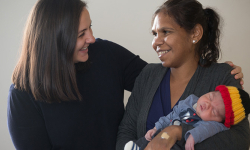 Aboriginal & Torres Strait Islander women
Aboriginal & Torres Strait Islander womenBadjurr-Bulok Wilam (‘Home of many women’; Woiwurrung language of the Wurundjeri Peoples) provides a culturally appropriate support and advocacy service to address to social, emotional and cultural needs.
Learn more -
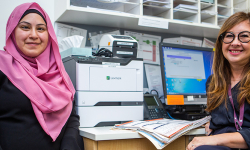 Disability Liaison Service
Disability Liaison ServiceThe Women's Disability Liaison Officer is here to help individuals with disabilities, their families, and carers access the care and support they need during their hospital visit
Learn more -
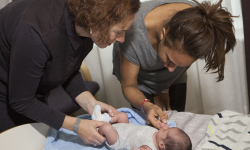 Hospital in the Home Service
Hospital in the Home ServiceThe Women's Hospital in the Home (HITH) program provides hospital-like care in the comfort of a person's own home.
Learn more -
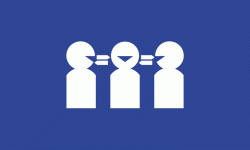 Language Services
Language ServicesLanguage Services provides interpreters for all patients with Limited English Proficiency who are treated at the Women’s.
Learn more -
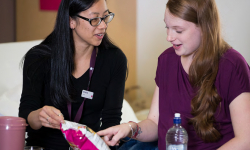 Nutrition & Dietetics
Nutrition & DieteticsThe Nutrition and Dietetics Department provides nutritional care to all patients of the hospital. Dieticians at the Women’s have specialist knowledge of nutrition and women’s health throughout all stages of the life cycle.
Learn more -
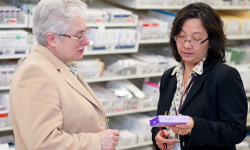 Pharmacy
PharmacyThe Pharmacy department supplies safe and effective medicines to inpatients and outpatients at the Women’s. Pharmacy also provides information to patients, carers and other healthcare professionals via the Medicines Information Service.
Learn more -
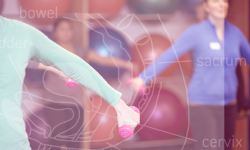 Physiotherapy
PhysiotherapyPhysiotherapy is an allied health service that provides inpatient and outpatient care for patients of the Women’s. Our physiotherapists have specialist knowledge of women’s health through all stages of the life cycle.
Learn more -
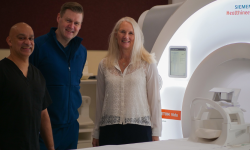 Radiology & Ultrasound
Radiology & UltrasoundThe Pauline Gandel Women's Imaging Centre provides a tertiary, complex integrated radiology and ultrasound service to patients.
Learn more -
 Social Work
Social WorkSocial workers are an important part of the multidisciplinary team approach to care across the hospital’s clinic areas.
Learn more -
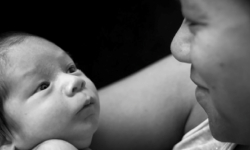 Spiritual Care
Spiritual CareThe Women’s aims to ensure that the spiritual and psychosocial values of patients, families and staff are treated with dignity.
Learn more -
 Victorian Perinatal Autopsy Service
Victorian Perinatal Autopsy ServiceThe Victorian Perinatal Autopsy Service (VPAS) enables best possible care and support for families and clinicians navigating pregnancy and newborn loss.
Learn more -
 Women’s Mental Health Service
Women’s Mental Health ServiceThe Women’s Mental Health Service provides assessment and treatment for patients of the Women's who have a comorbid mental health problem.
Learn more
Disclaimer
The clinical information and Clinical Guidelines available on this Website are intended to provide guidance to health care professionals, based on a thorough evaluation of research evidence, on the practical assessment and management of specific clinical issues or situations. The Guidelines allow some flexibility on the part of the health care professional based on the needs of the specific patient for whom they are caring. Whilst appreciable care has been taken in the preparation of Clinical Guidelines, the Women's provides these as a service only and does not warrant the accuracy of these Guidelines. Any representation implied or expressed concerning the efficacy, appropriateness or suitability of any treatment or product is expressly negated. In view of the possibility of human error and / or advances in medical knowledge, the Women's cannot and does not warrant that the information contained in the Guidelines is in every respect accurate or complete. Accordingly, the Women's will not be held responsible or liable for any errors or omissions that may be found in any of the information on this Website. You are encouraged to consult other sources in order to confirm the information contained in any of the Guidelines and, in the event that medical treatment is required, to take professional, expert advice from a legally qualified and appropriately experienced medical practitioner. For practitioners outside the Women’s this material is made available in good faith as a resource for use by health professionals to draw on in developing their own protocols, guided by published medical evidence. In doing so, practitioners should themselves be familiar with the literature and make their own interpretations of it. NOTE: Care should be taken when printing any Clinical Guideline from this Website. Updates to these guidelines will take place as necessary. It is therefore advised that regular visits to this Website will be needed to access the most current version of these guidelines.